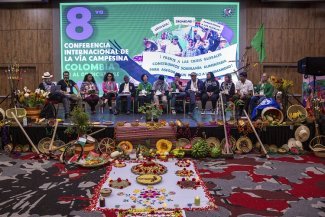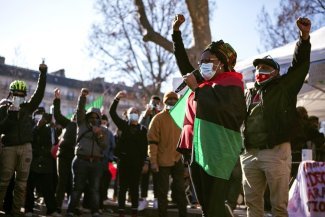In April 2013, Ethiopian journalist Reeyot Alemu was awarded the UNESCO/Guillermo Cano World Press Freedom Prize for “exceptional courage, resistance and commitment to freedom of expression.”
One year later and Alemu remains imprisoned – as she was at the time of her award – convicted under the country’s draconian anti-terrorism laws.
As a journalist, teacher and founder of the monthly magazine Change, Alemu covered many important social and political issues in Ethiopia, particularly around poverty and gender inequality.
But it was while working for a national weekly newspaper, Feteh, which, like Change has since been shut down, that she was arrested on 21 June 2011.
“Reeyot Alemu was arrested shortly after publishing an article that critically discussed the Ethiopian ruling party’s (EPRDF) practices,” explains one of Alemu’s international legal team, Nani Jansen.
Alemu was initially convicted on three counts under the wide-ranging, national anti-terrorism laws.
While her sentence was reduced from 14 to five years on appeal, she lost her appeal for the final five years of her sentence in January.
“The charge of ‘participating in a terrorist organisation’ was upheld, but she was acquitted of the three other charges brought against her,” says Jansen, who is a Senior Legal Counsel for the Media Legal Defence Initiative (MLDI).
“[These charges] included money laundering and ‘processing and dealing with the proceeds of terrorist acts’”.
Africa’s second worst jailer of journalists
Tragically, Alemu is far from the only journalist imprisoned in Ethiopia.
According to the International Federation of Journalists (IFJ), there are currently seven, including another award-winning journalist Eskinder Nega who is serving an 18-year sentence, convicted under the same legislation.
In a recent open letter to the EU-Africa Summit in Brussels, IFJ President Jim Boumelha stated: “Ethiopia trails only Eritrea as Africa’s worst jailers of the press,” and refers to “trumped up charges, including ‘terrorism’”.
Foreign journalists have also fallen foul of Ethiopia’s harsh terror laws. In June 2011, Swedish journalist Martin Schibbye and photographer Johan Persson were sentenced to 11 years in prison for “rendering support to terrorism”.
They were found reporting in the restricted conflict-zone of Ogaden, and were only pardoned in September 2012 thanks to concerted international pressure.
Ethiopia’s 2009 Anti-Terrorism Proclamation is regularly used to convict journalists, students and political opponents. The Human Rights Watch (HRW) World Report 2014http://www.hrw.org/world-report/201... says Ethiopia exercises a “tight government stranglehold” on independent media, resulting in both indirect and direct censorship within the country.
“Web pages and blogs critical of the government are regularly blocked, and foreign radio and TV stations are routinely jammed”.
Claire Beston, a researcher for Ethiopia and Eritrea for Amnesty International told Equal Times that “freedom of expression in Ethiopia has been under sustained attack for many years. There are severe restrictions on, and harassment of, the independent media.”
As a result, a large number of journalists have fled the country – in fact, Ethiopia has the third largest number of journalists in exile globally.
Prison Life
Human rights groups create a chilling picture of life inside Ethiopia’s prisons, with a lack of adequate food, water, sanitation and medical treatment being par for the course.
Additionally, the HRW World Report 2014: Ethiopia refers to arbitrary detention and ill-treatment, with independent investigators denied regular access to prisons and detention centres.
In Alemu’s case, the lack of medical treatment and access to independent care has been a major concern as she has been diagnosed with fybroadenoma (benign breast tumours) while in prison.
“She has received some treatment, but it is unclear at this stage if that treatment was sufficient and it appears she did not receive the appropriate after-care following surgery,” says Jansen.
Alemu has also been denied access to her own medical records, which were declared “lost” following a complaint to the African Commission on Human and Peoples’ Rights.
Only her parents have been allowed to visit her. Her father, Alemu Gobebo, is her acting legal counsel, but is restricted from speaking to her in that capacity, in violation of both international law and the Ethiopian constitution.
In the meantime, Jansen sees the situation for a free press in Ethiopia as “worrying” and hopes that the International community will continue to put pressure on the Ethiopian government.
“Ms Alemu’s case is one of the many unjustified prosecutions taking place in Ethiopia under the guise of “combating terrorism”,’ says Jansen.
“We have documented 13 other prosecutions of journalists under the 2009 Anti-Terrorism Proclamation. In addition, we have listed the closure of 14 news outlets and at least 30 other acts of oppression of the free press since the Proclamation was introduced. This is just the tip of the iceberg and shows that Ethiopia is using its anti-terrorism laws to stifle a free press and other dissenting voices in the country.”
Click here to sign the Change petition to help free Reeyot Alemu.









